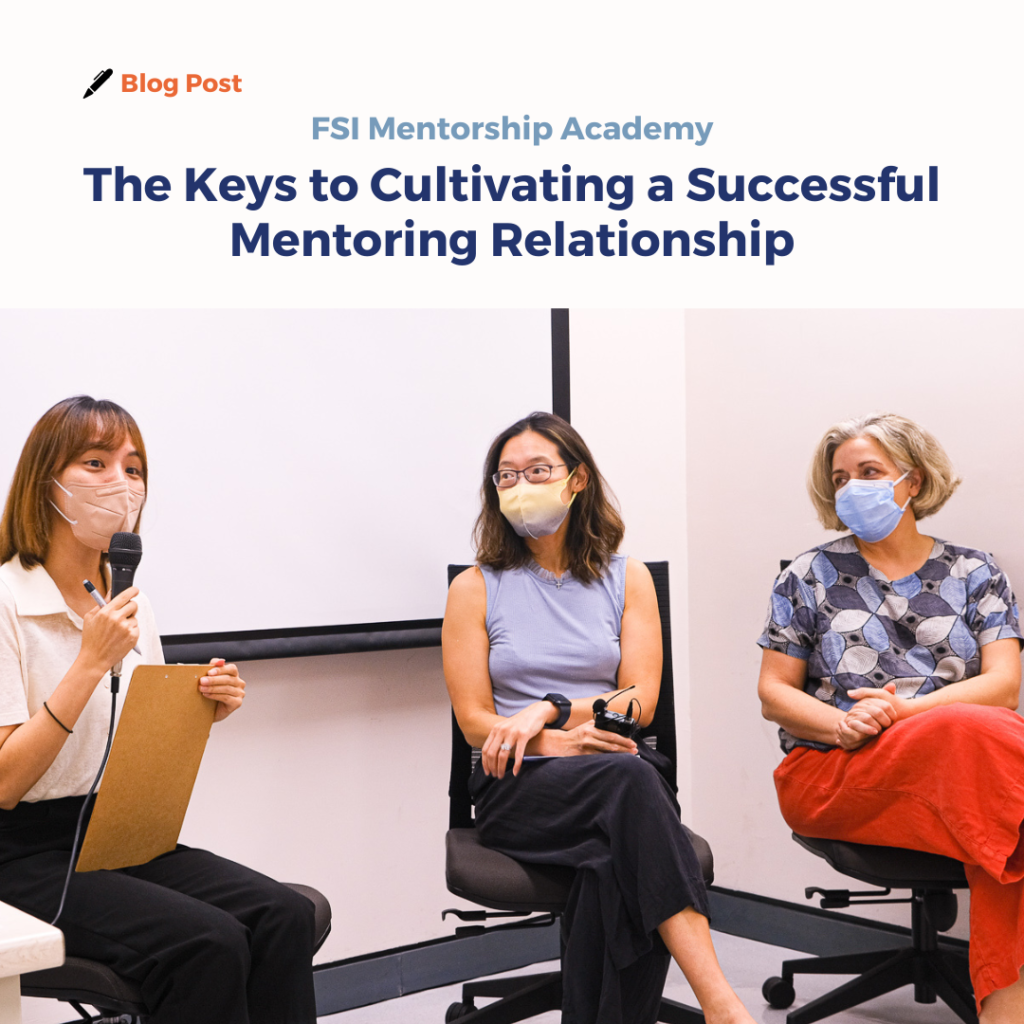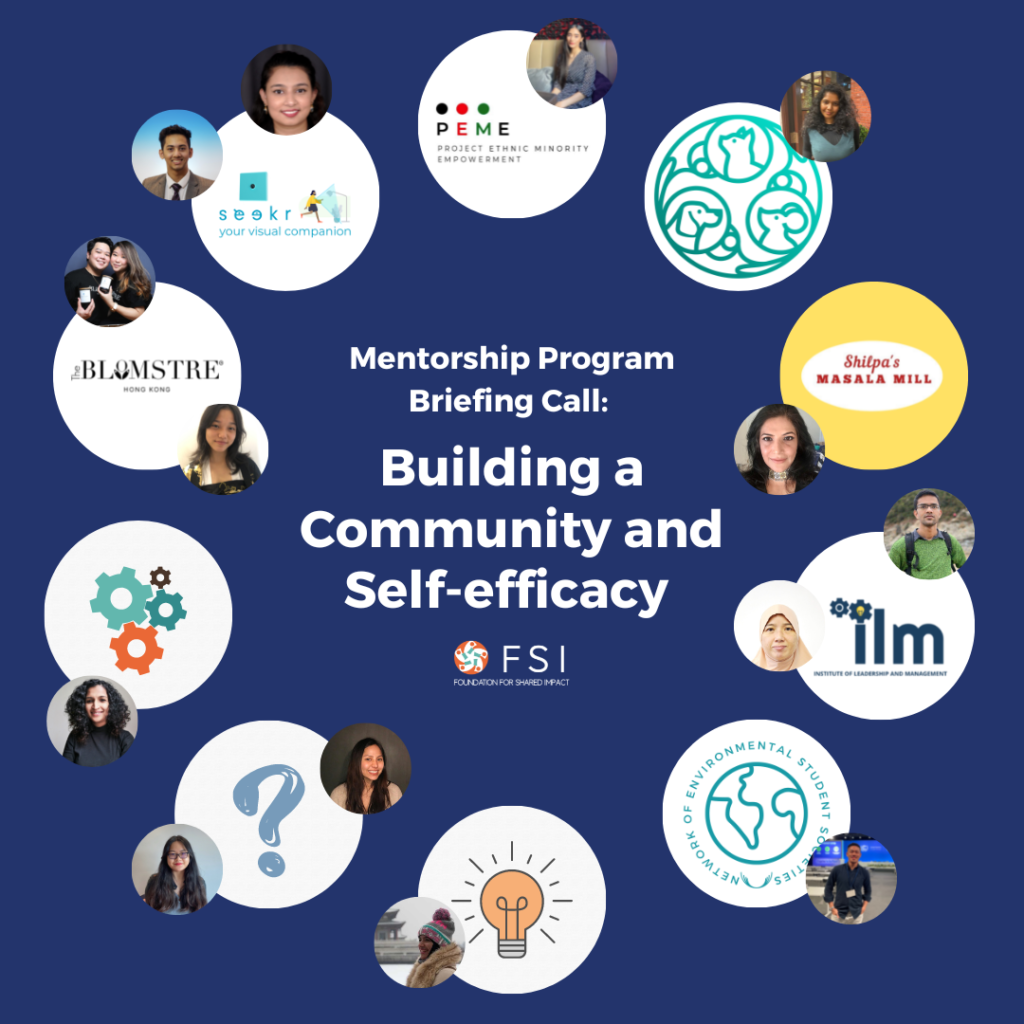Suppose today is an ordinary workday for you. Do you recall what you had for breakfast (or lunch)? Do you recall how it tasted and smelt, how it felt on your lips as you took bites of it? Did you notice anything different on the same route you took to work? What happened this week that you are grateful for?
We often go about our lives without much awareness of our surroundings and our physical and mental state of being. “We are not very good at looking after our own wellbeing,” said Nimisha Vandan, Co-founder of OkayMinds, who conducted the Mental Resilience workshop for the mentees and mentors of our Mentorship Program for Ethnically Diverse Entrepreneurs on 22 November.
The reason behind that varies. In the busy life we live day in, day out, we often feel that we are not allowed to look after our own wellbeing. We were not brought up to do this. It’s considered self-indulgent.
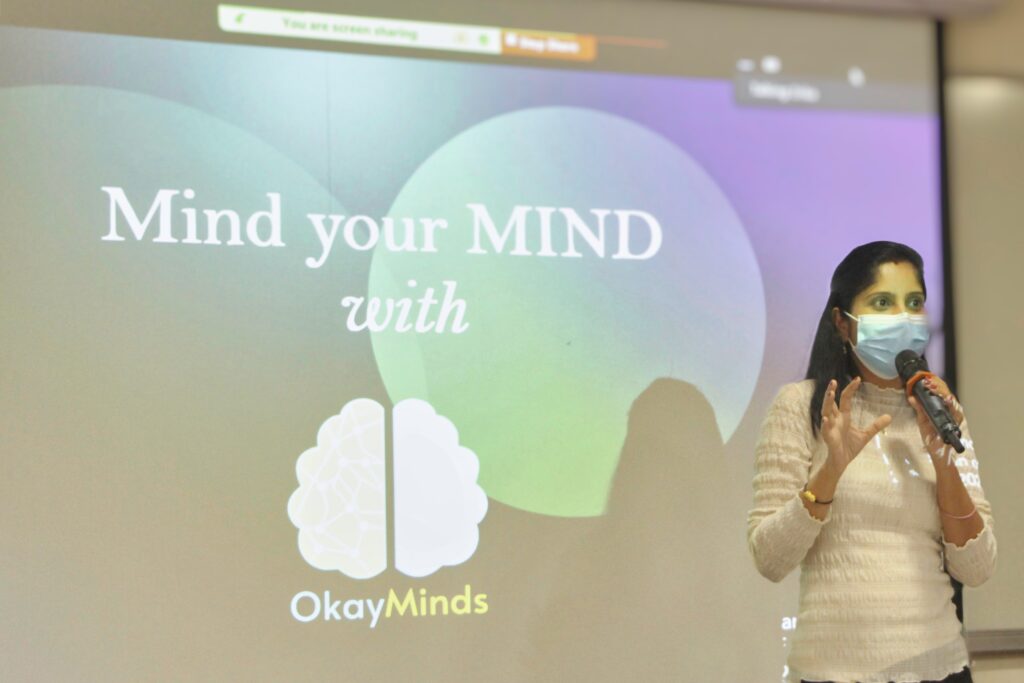
But we are neglecting our wellbeing at our own cost, said Nimisha. The absence of mindfulness is the reason why we would let Automatic Negative Thoughts (ANTS) take over our mind. By being the harshest critic of ourselves, we are often unaware of how our negative emotions lead to undesirable behaviors, which can be detrimental to our relationship with others.
And so on this Tuesday evening, Nimisha helped the mentees and mentors bring consciousness back to their bodies with several body movement exercises. For those who are unfamiliar with Eyeball Yoga, it is an exercise that involves focusing on an object, say a pen, held both close-up and far away. Not only does the purposeful exercise relieve eye strain, it also helps increase the responsiveness of our brain and calm down our body and mind.
To be present in the moment, to focus on the task on hand, is beneficial to our mental wellbeing. “We carry our past, present, and future with us all the time, and that can give us a lot of stress,” said Nimisha. “We think of the mistakes we made in the past, we worry about what might happen in the future.” When we practise present-moment mindfulness, we will no longer see life as merely flying by. We will be able to appreciate the wonders big and small in our life, lessen our anxiety, nurture our creativity and be more productive at work, and we will be able to build better relationships with others.
Using another example to help the entrepreneurs practise mindfulness, Nimisha gave them each a candy and asked them to first describe the look of the candy to their partners, then touch it, listen to it, put it on their lips to feel the sensations it aroused, before putting it in their mouth to taste it and eat it.
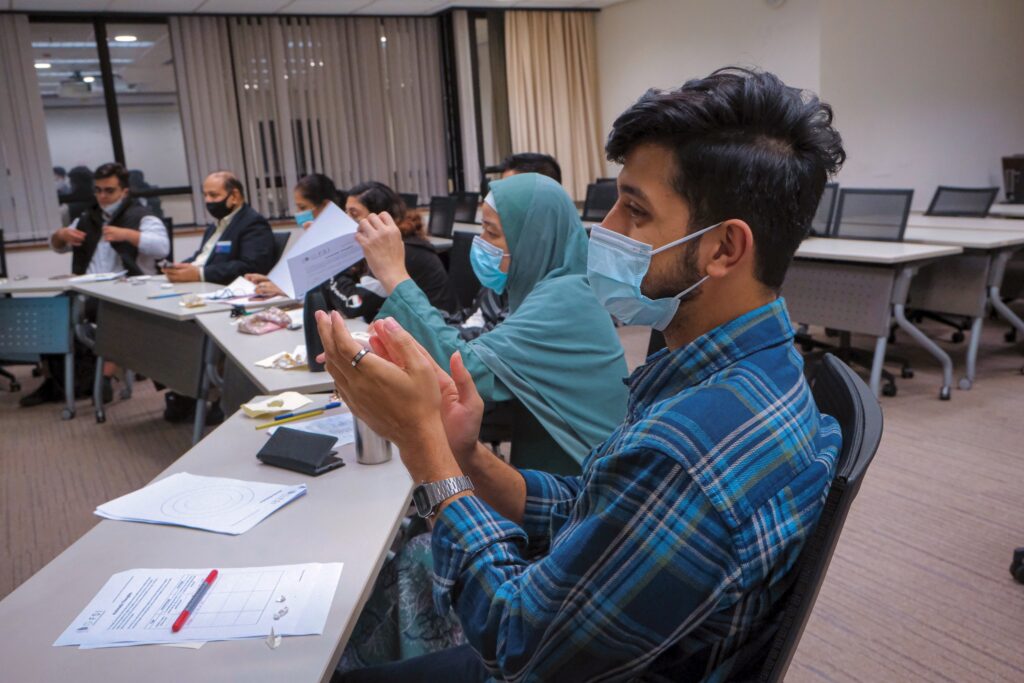
Once the candy was savored, Nimisha gave the entrepreneurs each a piece of paper, which they had to follow her simple instructions to fold in half and tear off the top right and top left corner respectively. When the pieces of paper were unfolded, they revealed a variation of outlook: some had a hole in the center, some had two holes, some others had scalloped edges. “So you see, our emotional, physical, and mental states are very different,” said Nimisha. “We all have the intuitive ability to do things at our own pace and be ourselves. Remember, life isn’t a competition. We should do things in ways that work best for us.”
Given a typical day, we would be stressed about one thing or another. It’s just how our mind works, said Nimisha: it is wired to focus on the negative. At times like this, slow and steady breathing can create a calm mind. “Compared to the average adult who breathes 15-16 times per minute, a yogi breathes about 6-11 times per minute,” said Nimisha. “When we are overthinking and anxious, quick and shallow breaths take over. We need to pause ourselves there and take deep breaths.”
According to Nimisha, breathing like a yogi means that when we inhale, we fill our lungs with air and we can feel our stomach expand. When we exhale, we empty our lungs of air, and we can feel our stomach contract.
Another type of breathwork Nimisha demonstrated was alternate-nostril breathing, which involved breathing in through one nostril and out the other. This breathing technique can help us regulate the balance of our nervous system and reduce stress and anxiety, by improving the oxygen flow and centering our mind and body to the present moment.
To help entrepreneurs seek mental clarity and peace of mind, Nimisha guided them through a 10-minute meditation session. This was followed by a Mandala Meditation exercise, also known as mandala art therapy, where, on a piece of paper with rings of circles, entrepreneurs were asked to decorate with traditional mandala patterns or their own creation. Both exercises carry the benefits of stress relief, improving attentiveness, self-awareness, and overall physical and mental wellbeing by slowing down and clarifying our thoughts.
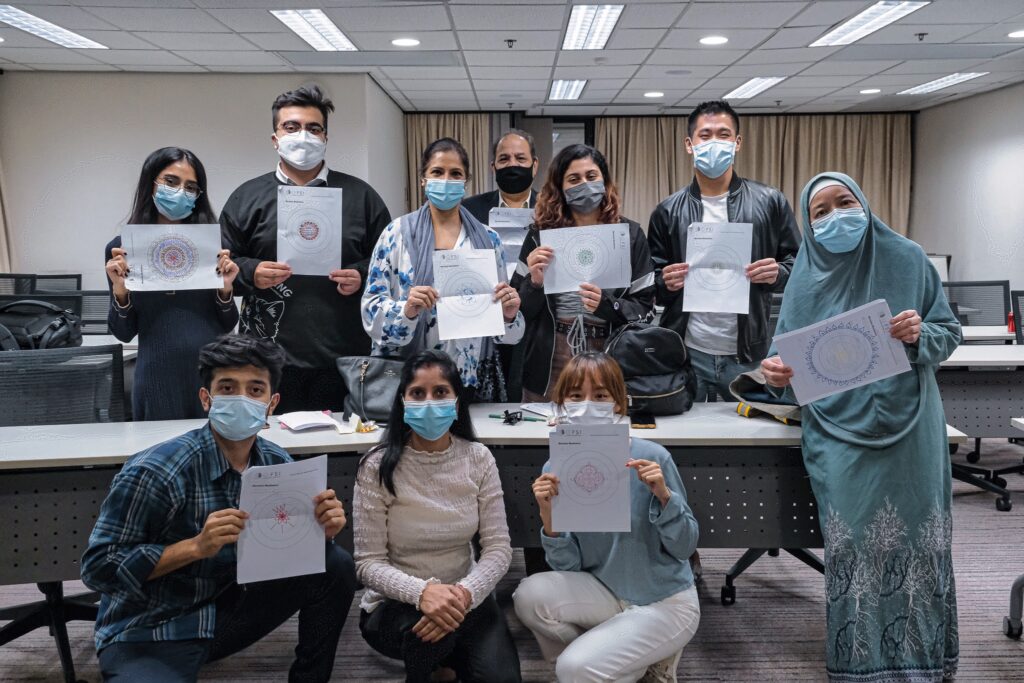
“When we have negative thoughts, it blocks our energy,” said Nimisha. “That’s when we experience physical pain and burning sensations, mental and physical illnesses, and emotional outbursts.”
In order to find better ways to clarify our thoughts and manage our stress responses, we must first understand our thought cycle. Typically, our thoughts, which comprise sensory data, memories, our perception of the surroundings etc., influence our emotions, which then trigger certain behaviors and outcomes. For example, if we recall a time when a friend faulted us, that memory would trigger negative emotions such as anger or frustration, and that emotion would influence our behavior towards that friend (or even others who are not responsible for that incident). The likely outcome is that we would react unpleasantly to that friend even though that incident might have taken place a long time ago and they haven’t done anything recently to deserve your anger.
Here, Nimisha emphasized again that our brain is wired for the negative. “Our mind takes us to the future or the past. And while these negative thoughts may be normal, they are not always true or helpful,” said Nimisha. “You have the power to either accept them as fact, or question them and move on.”
Our Automatic Negative Thoughts (ANTS) imprison us in Thinking Traps, and there are three main types of Thinking Traps:
- All-or-nothing Thinking: You only believe in perfection and you won’t accept anything less than perfection.
- Jumping to Conclusions: Always making assumptions and overthinking situations.
- Emotional Reasoning: Using feelings to make judgements and decisions instead of using logic and facts.
However, all is not lost. Through Cognitive Reframing, we can turn our Automatic Negative Thoughts (ANTS) into Positive Empowering Thoughts (PETS). Utilizing an example, Nimisha helped entrepreneurs identify their automatic thoughts, feelings, and the subsequent behavior surrounding that scenario. She then guided them to interpret and respond to the scenario with an alternative approach.
“For example, we may let All-or-nothing Thinking take over and think of our work product as not perfect and see it and ourselves as a complete failure,” said Nimisha. “Through Cognitive Reframing, we will be able to see perfection as unrealistic, and that trying our best is all that matters.”
As mentioned by one of the entrepreneurs, imposter syndrome is the source of relentless anxiety. “Sometimes we may feel inadequate. We feel that we ought to know something. But we can reframe this irrational way of thinking into acknowledging the fact that we continue to learn every day, and it is unrealistic to know everything. Don’t believe everything you think. When you are having Automatic Negative Thoughts, pause and ask yourself, is this thought helpful? Will this matter in five years? If someone is experiencing this thought, what advice would I give them?”
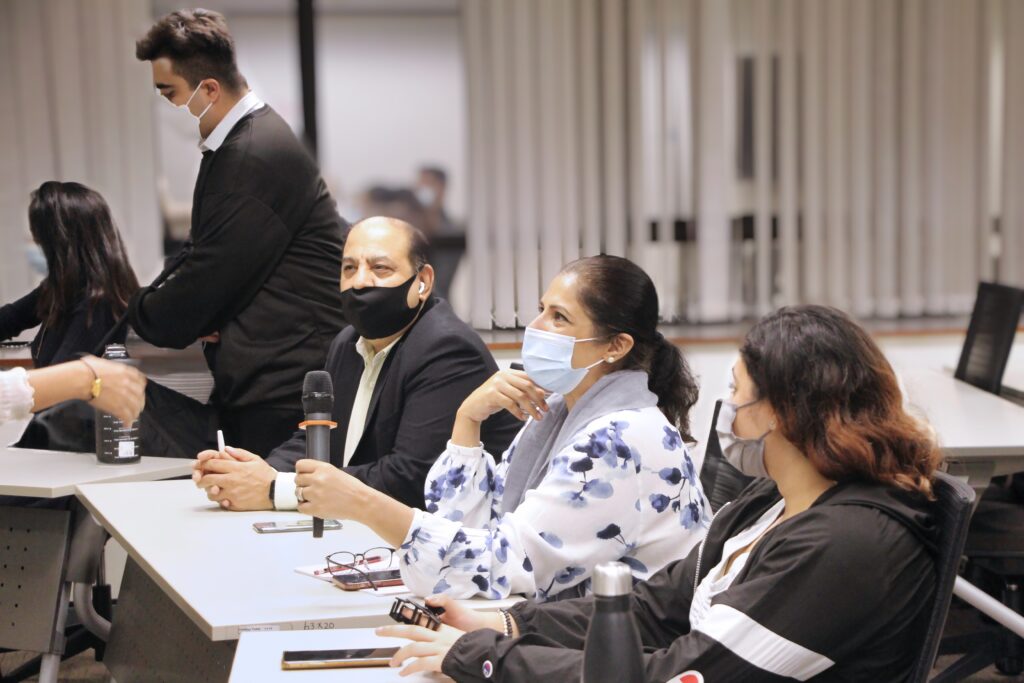
One way to liberate ourselves from Automatic Negative Thoughts and Thinking Traps is by practising gratitude. There are many benefits to practising gratitude, including lasting happiness, improving physical and mental health, better sleep, strengthening self-control, social wellbeing, and being in a better state to achieve career and life goals.
“Ask yourself, what are you grateful for in your life right now,” said Nimisha. “Did something good happen to you this week? Is there something silly that you are grateful for? What are you grateful to your family and friends for?”
Practising gratitude requires noticing and reflecting upon things that we often take for granted. That is why doing it regularly can help us experience more positive emotions and allow us to express more compassion. Moreover, practising gratitude, meditation, and mindfulness can lower the levels of cortisol and other stress hormones, which are the main causes of mental and physical health problems such as anxiety, depression, digestive problems, muscle pain, heart disease, memory and concentration impairment.
Entrepreneurship is both rewarding and challenging as we strive to serve our community with our best intent and effort. It is often easy for us to fall into Thinking Traps and undermine our self-worth and the value of our work. However, we can’t do our best work and serve our community the best we can if we are not well, mentally and physically.
Being mentally resilient enables us to manage stress and recover from stressful events effectively. We hope the entrepreneurs were able to take away the knowledge Nimisha has shared on self-compassion and mindfulness, so that they can start building mental resilience for themselves and the people around them!
*Interested in supporting our work on helping ethnically diverse entrepreneurs start and scale their business? Donate to us or get in touch with us on cbs@shared-impact.com!


